Coca-Cola's B2C Model: Ethical Challenges and Triple Bottom Line
VerifiedAdded on 2023/06/15
|6
|1367
|414
Report
AI Summary
This report explores the ethical business model of Coca-Cola, focusing on its business-to-consumer approach and adherence to the triple bottom line (profit, people, and planet). It identifies various ethical challenges faced by the company, including environmental impact, social issues, cultural context, political environment, and economic inequalities. The report suggests ways to minimize these challenges, such as implementing stricter environmental policies, complying with health and safety laws, promoting diversity and inclusion, focusing on social responsibility, and adhering to ethical principles. The analysis emphasizes the importance of ethical practices for the company's success and sustainability.
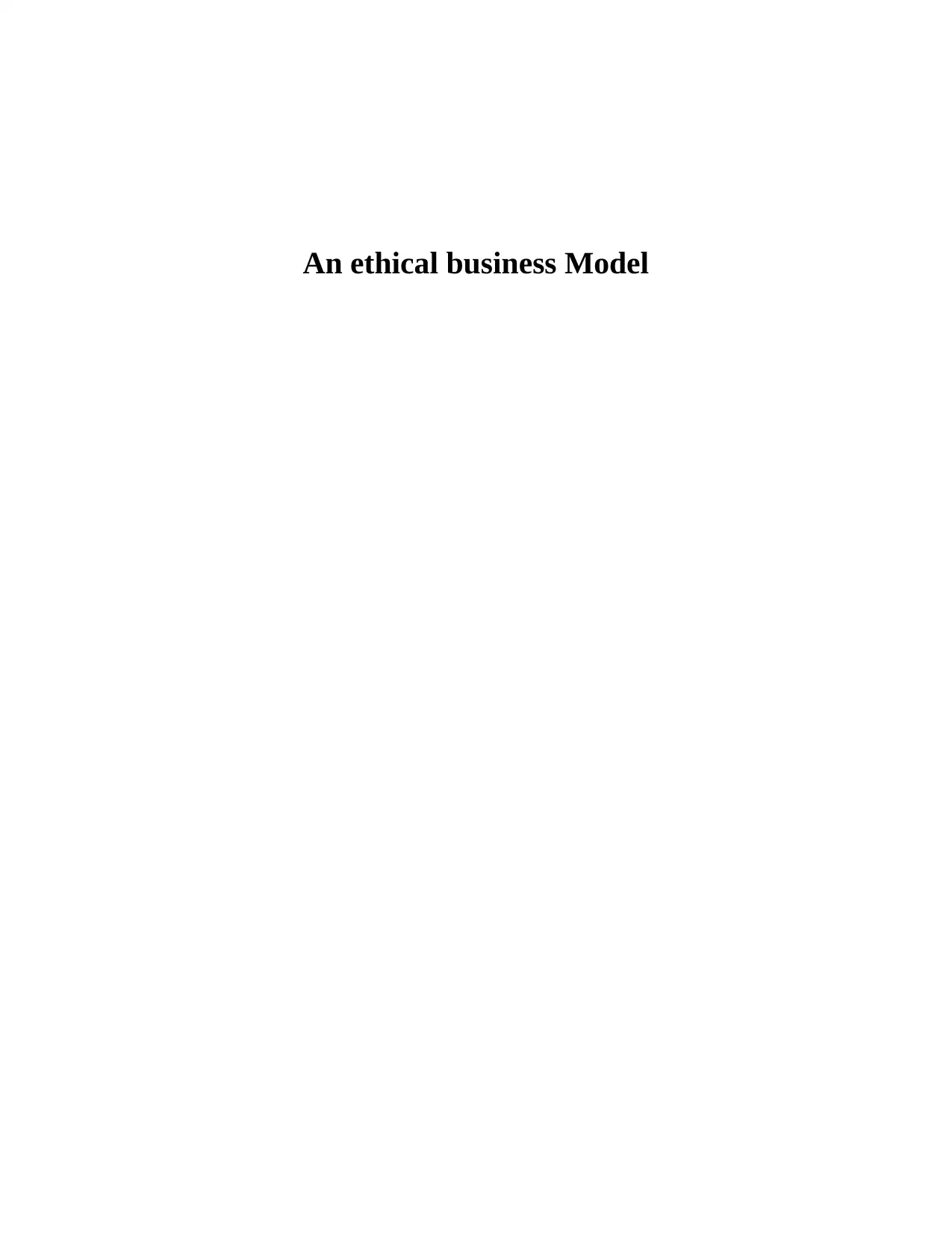
An ethical business Model
Paraphrase This Document
Need a fresh take? Get an instant paraphrase of this document with our AI Paraphraser
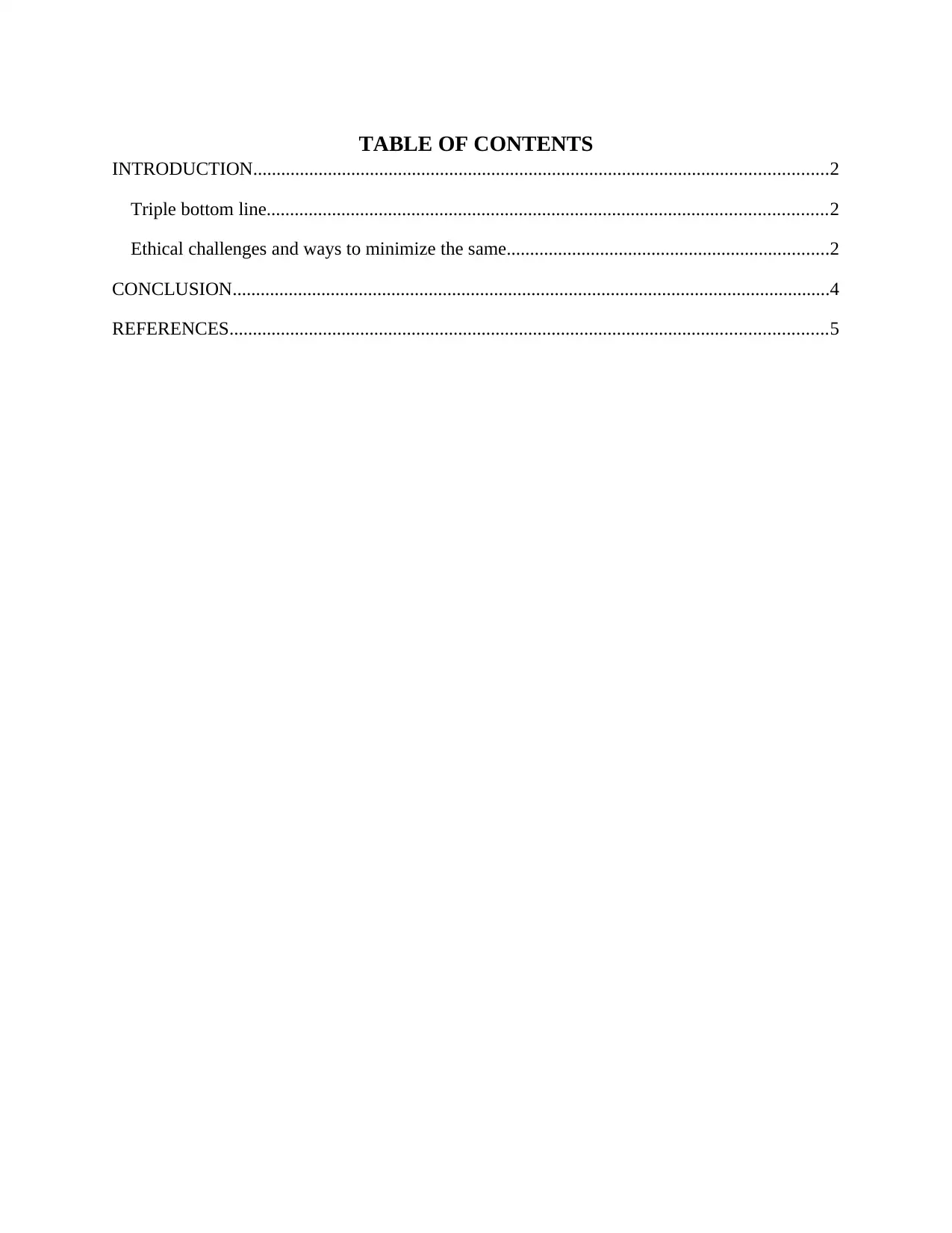
TABLE OF CONTENTS
INTRODUCTION...........................................................................................................................2
Triple bottom line........................................................................................................................2
Ethical challenges and ways to minimize the same.....................................................................2
CONCLUSION................................................................................................................................4
REFERENCES................................................................................................................................5
INTRODUCTION...........................................................................................................................2
Triple bottom line........................................................................................................................2
Ethical challenges and ways to minimize the same.....................................................................2
CONCLUSION................................................................................................................................4
REFERENCES................................................................................................................................5
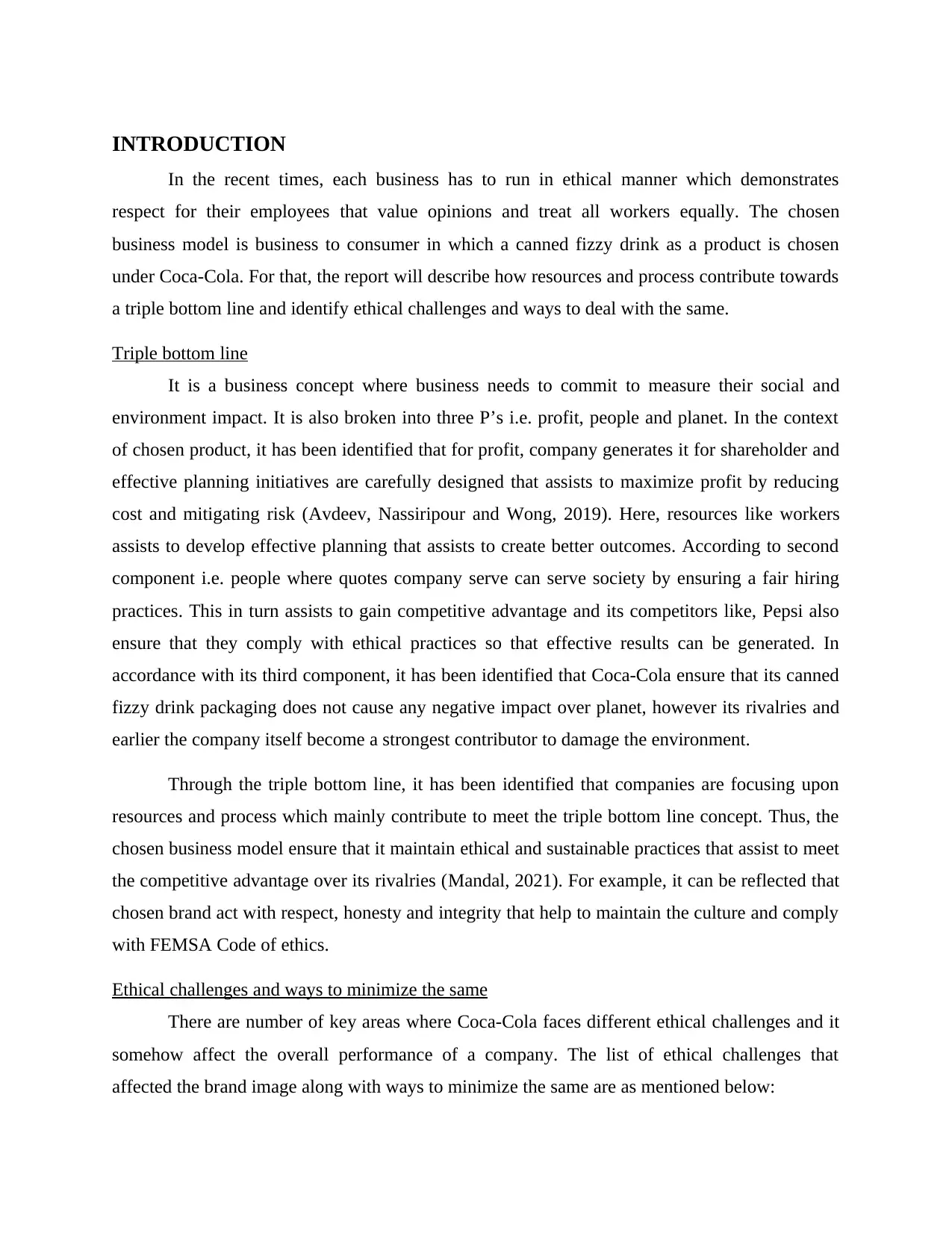
INTRODUCTION
In the recent times, each business has to run in ethical manner which demonstrates
respect for their employees that value opinions and treat all workers equally. The chosen
business model is business to consumer in which a canned fizzy drink as a product is chosen
under Coca-Cola. For that, the report will describe how resources and process contribute towards
a triple bottom line and identify ethical challenges and ways to deal with the same.
Triple bottom line
It is a business concept where business needs to commit to measure their social and
environment impact. It is also broken into three P’s i.e. profit, people and planet. In the context
of chosen product, it has been identified that for profit, company generates it for shareholder and
effective planning initiatives are carefully designed that assists to maximize profit by reducing
cost and mitigating risk (Avdeev, Nassiripour and Wong, 2019). Here, resources like workers
assists to develop effective planning that assists to create better outcomes. According to second
component i.e. people where quotes company serve can serve society by ensuring a fair hiring
practices. This in turn assists to gain competitive advantage and its competitors like, Pepsi also
ensure that they comply with ethical practices so that effective results can be generated. In
accordance with its third component, it has been identified that Coca-Cola ensure that its canned
fizzy drink packaging does not cause any negative impact over planet, however its rivalries and
earlier the company itself become a strongest contributor to damage the environment.
Through the triple bottom line, it has been identified that companies are focusing upon
resources and process which mainly contribute to meet the triple bottom line concept. Thus, the
chosen business model ensure that it maintain ethical and sustainable practices that assist to meet
the competitive advantage over its rivalries (Mandal, 2021). For example, it can be reflected that
chosen brand act with respect, honesty and integrity that help to maintain the culture and comply
with FEMSA Code of ethics.
Ethical challenges and ways to minimize the same
There are number of key areas where Coca-Cola faces different ethical challenges and it
somehow affect the overall performance of a company. The list of ethical challenges that
affected the brand image along with ways to minimize the same are as mentioned below:
In the recent times, each business has to run in ethical manner which demonstrates
respect for their employees that value opinions and treat all workers equally. The chosen
business model is business to consumer in which a canned fizzy drink as a product is chosen
under Coca-Cola. For that, the report will describe how resources and process contribute towards
a triple bottom line and identify ethical challenges and ways to deal with the same.
Triple bottom line
It is a business concept where business needs to commit to measure their social and
environment impact. It is also broken into three P’s i.e. profit, people and planet. In the context
of chosen product, it has been identified that for profit, company generates it for shareholder and
effective planning initiatives are carefully designed that assists to maximize profit by reducing
cost and mitigating risk (Avdeev, Nassiripour and Wong, 2019). Here, resources like workers
assists to develop effective planning that assists to create better outcomes. According to second
component i.e. people where quotes company serve can serve society by ensuring a fair hiring
practices. This in turn assists to gain competitive advantage and its competitors like, Pepsi also
ensure that they comply with ethical practices so that effective results can be generated. In
accordance with its third component, it has been identified that Coca-Cola ensure that its canned
fizzy drink packaging does not cause any negative impact over planet, however its rivalries and
earlier the company itself become a strongest contributor to damage the environment.
Through the triple bottom line, it has been identified that companies are focusing upon
resources and process which mainly contribute to meet the triple bottom line concept. Thus, the
chosen business model ensure that it maintain ethical and sustainable practices that assist to meet
the competitive advantage over its rivalries (Mandal, 2021). For example, it can be reflected that
chosen brand act with respect, honesty and integrity that help to maintain the culture and comply
with FEMSA Code of ethics.
Ethical challenges and ways to minimize the same
There are number of key areas where Coca-Cola faces different ethical challenges and it
somehow affect the overall performance of a company. The list of ethical challenges that
affected the brand image along with ways to minimize the same are as mentioned below:
⊘ This is a preview!⊘
Do you want full access?
Subscribe today to unlock all pages.

Trusted by 1+ million students worldwide
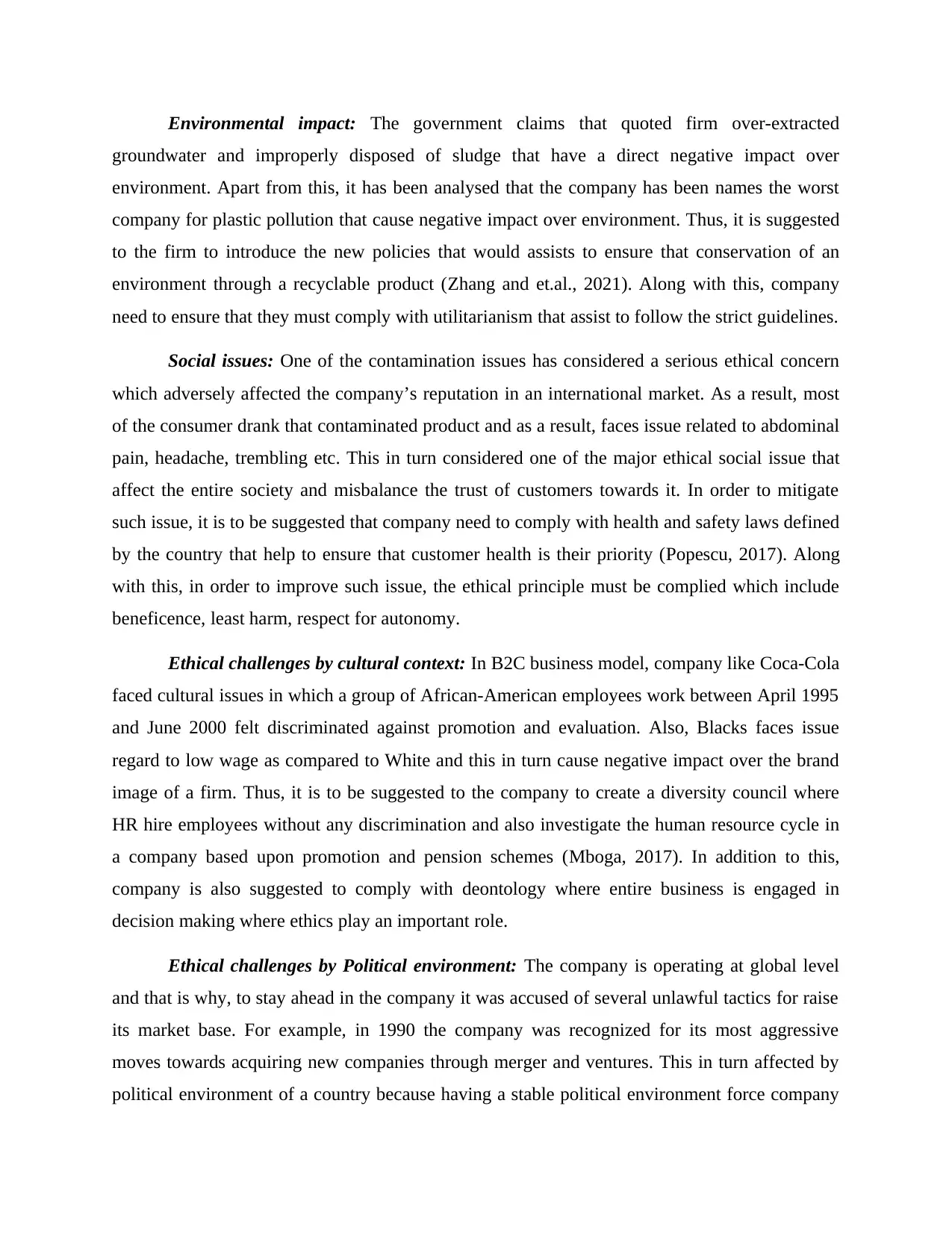
Environmental impact: The government claims that quoted firm over-extracted
groundwater and improperly disposed of sludge that have a direct negative impact over
environment. Apart from this, it has been analysed that the company has been names the worst
company for plastic pollution that cause negative impact over environment. Thus, it is suggested
to the firm to introduce the new policies that would assists to ensure that conservation of an
environment through a recyclable product (Zhang and et.al., 2021). Along with this, company
need to ensure that they must comply with utilitarianism that assist to follow the strict guidelines.
Social issues: One of the contamination issues has considered a serious ethical concern
which adversely affected the company’s reputation in an international market. As a result, most
of the consumer drank that contaminated product and as a result, faces issue related to abdominal
pain, headache, trembling etc. This in turn considered one of the major ethical social issue that
affect the entire society and misbalance the trust of customers towards it. In order to mitigate
such issue, it is to be suggested that company need to comply with health and safety laws defined
by the country that help to ensure that customer health is their priority (Popescu, 2017). Along
with this, in order to improve such issue, the ethical principle must be complied which include
beneficence, least harm, respect for autonomy.
Ethical challenges by cultural context: In B2C business model, company like Coca-Cola
faced cultural issues in which a group of African-American employees work between April 1995
and June 2000 felt discriminated against promotion and evaluation. Also, Blacks faces issue
regard to low wage as compared to White and this in turn cause negative impact over the brand
image of a firm. Thus, it is to be suggested to the company to create a diversity council where
HR hire employees without any discrimination and also investigate the human resource cycle in
a company based upon promotion and pension schemes (Mboga, 2017). In addition to this,
company is also suggested to comply with deontology where entire business is engaged in
decision making where ethics play an important role.
Ethical challenges by Political environment: The company is operating at global level
and that is why, to stay ahead in the company it was accused of several unlawful tactics for raise
its market base. For example, in 1990 the company was recognized for its most aggressive
moves towards acquiring new companies through merger and ventures. This in turn affected by
political environment of a country because having a stable political environment force company
groundwater and improperly disposed of sludge that have a direct negative impact over
environment. Apart from this, it has been analysed that the company has been names the worst
company for plastic pollution that cause negative impact over environment. Thus, it is suggested
to the firm to introduce the new policies that would assists to ensure that conservation of an
environment through a recyclable product (Zhang and et.al., 2021). Along with this, company
need to ensure that they must comply with utilitarianism that assist to follow the strict guidelines.
Social issues: One of the contamination issues has considered a serious ethical concern
which adversely affected the company’s reputation in an international market. As a result, most
of the consumer drank that contaminated product and as a result, faces issue related to abdominal
pain, headache, trembling etc. This in turn considered one of the major ethical social issue that
affect the entire society and misbalance the trust of customers towards it. In order to mitigate
such issue, it is to be suggested that company need to comply with health and safety laws defined
by the country that help to ensure that customer health is their priority (Popescu, 2017). Along
with this, in order to improve such issue, the ethical principle must be complied which include
beneficence, least harm, respect for autonomy.
Ethical challenges by cultural context: In B2C business model, company like Coca-Cola
faced cultural issues in which a group of African-American employees work between April 1995
and June 2000 felt discriminated against promotion and evaluation. Also, Blacks faces issue
regard to low wage as compared to White and this in turn cause negative impact over the brand
image of a firm. Thus, it is to be suggested to the company to create a diversity council where
HR hire employees without any discrimination and also investigate the human resource cycle in
a company based upon promotion and pension schemes (Mboga, 2017). In addition to this,
company is also suggested to comply with deontology where entire business is engaged in
decision making where ethics play an important role.
Ethical challenges by Political environment: The company is operating at global level
and that is why, to stay ahead in the company it was accused of several unlawful tactics for raise
its market base. For example, in 1990 the company was recognized for its most aggressive
moves towards acquiring new companies through merger and ventures. This in turn affected by
political environment of a country because having a stable political environment force company
Paraphrase This Document
Need a fresh take? Get an instant paraphrase of this document with our AI Paraphraser
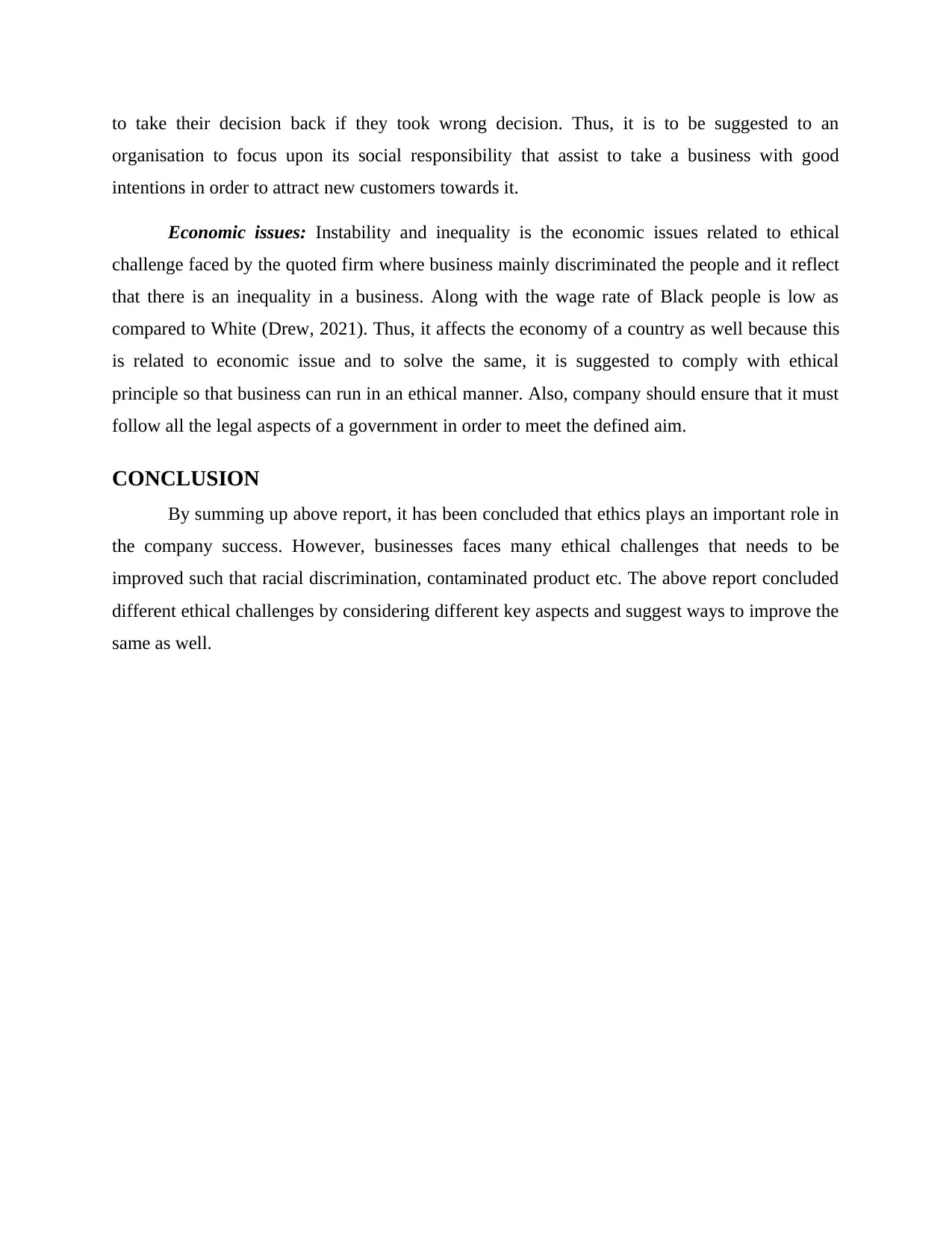
to take their decision back if they took wrong decision. Thus, it is to be suggested to an
organisation to focus upon its social responsibility that assist to take a business with good
intentions in order to attract new customers towards it.
Economic issues: Instability and inequality is the economic issues related to ethical
challenge faced by the quoted firm where business mainly discriminated the people and it reflect
that there is an inequality in a business. Along with the wage rate of Black people is low as
compared to White (Drew, 2021). Thus, it affects the economy of a country as well because this
is related to economic issue and to solve the same, it is suggested to comply with ethical
principle so that business can run in an ethical manner. Also, company should ensure that it must
follow all the legal aspects of a government in order to meet the defined aim.
CONCLUSION
By summing up above report, it has been concluded that ethics plays an important role in
the company success. However, businesses faces many ethical challenges that needs to be
improved such that racial discrimination, contaminated product etc. The above report concluded
different ethical challenges by considering different key aspects and suggest ways to improve the
same as well.
organisation to focus upon its social responsibility that assist to take a business with good
intentions in order to attract new customers towards it.
Economic issues: Instability and inequality is the economic issues related to ethical
challenge faced by the quoted firm where business mainly discriminated the people and it reflect
that there is an inequality in a business. Along with the wage rate of Black people is low as
compared to White (Drew, 2021). Thus, it affects the economy of a country as well because this
is related to economic issue and to solve the same, it is suggested to comply with ethical
principle so that business can run in an ethical manner. Also, company should ensure that it must
follow all the legal aspects of a government in order to meet the defined aim.
CONCLUSION
By summing up above report, it has been concluded that ethics plays an important role in
the company success. However, businesses faces many ethical challenges that needs to be
improved such that racial discrimination, contaminated product etc. The above report concluded
different ethical challenges by considering different key aspects and suggest ways to improve the
same as well.
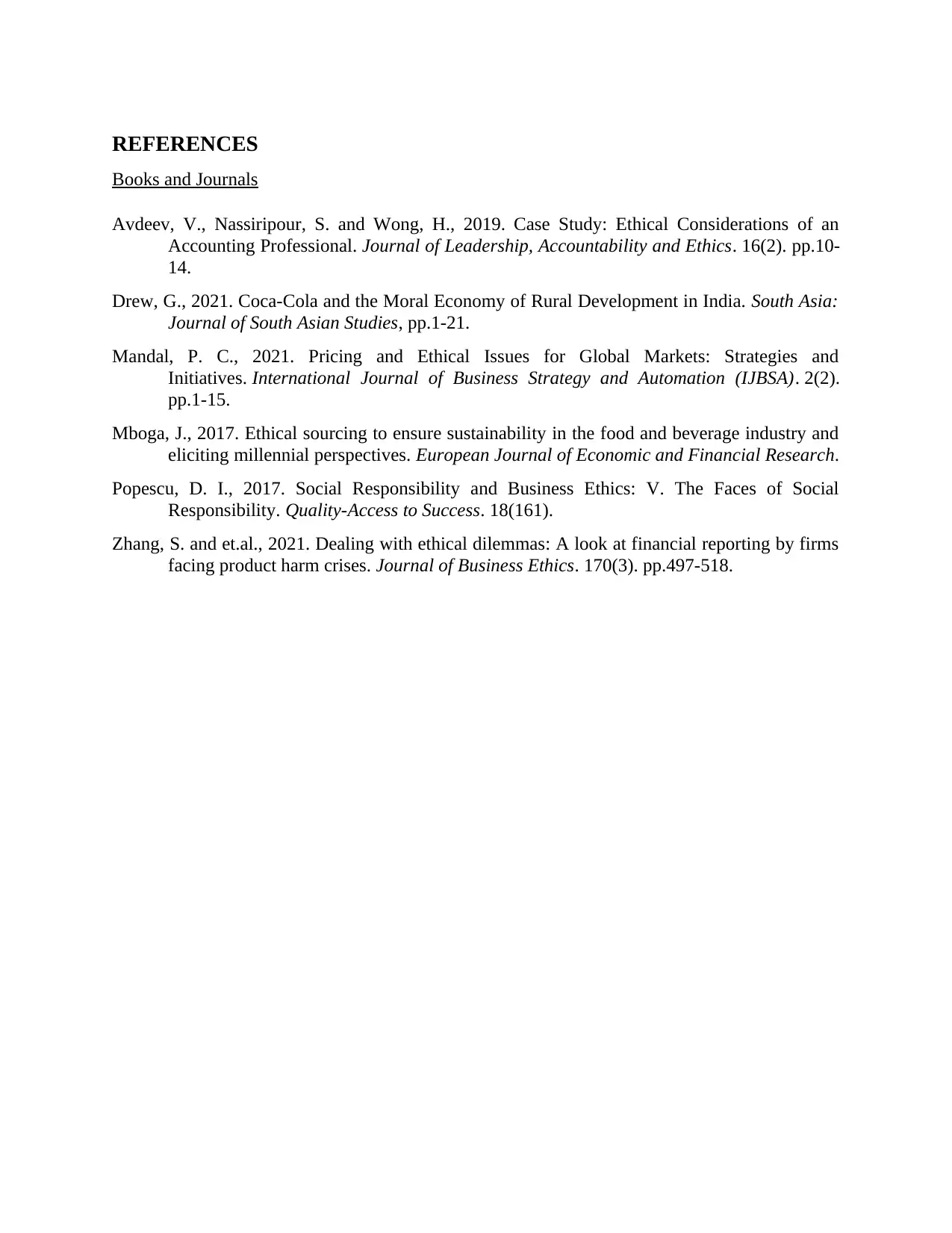
REFERENCES
Books and Journals
Avdeev, V., Nassiripour, S. and Wong, H., 2019. Case Study: Ethical Considerations of an
Accounting Professional. Journal of Leadership, Accountability and Ethics. 16(2). pp.10-
14.
Drew, G., 2021. Coca-Cola and the Moral Economy of Rural Development in India. South Asia:
Journal of South Asian Studies, pp.1-21.
Mandal, P. C., 2021. Pricing and Ethical Issues for Global Markets: Strategies and
Initiatives. International Journal of Business Strategy and Automation (IJBSA). 2(2).
pp.1-15.
Mboga, J., 2017. Ethical sourcing to ensure sustainability in the food and beverage industry and
eliciting millennial perspectives. European Journal of Economic and Financial Research.
Popescu, D. I., 2017. Social Responsibility and Business Ethics: V. The Faces of Social
Responsibility. Quality-Access to Success. 18(161).
Zhang, S. and et.al., 2021. Dealing with ethical dilemmas: A look at financial reporting by firms
facing product harm crises. Journal of Business Ethics. 170(3). pp.497-518.
Books and Journals
Avdeev, V., Nassiripour, S. and Wong, H., 2019. Case Study: Ethical Considerations of an
Accounting Professional. Journal of Leadership, Accountability and Ethics. 16(2). pp.10-
14.
Drew, G., 2021. Coca-Cola and the Moral Economy of Rural Development in India. South Asia:
Journal of South Asian Studies, pp.1-21.
Mandal, P. C., 2021. Pricing and Ethical Issues for Global Markets: Strategies and
Initiatives. International Journal of Business Strategy and Automation (IJBSA). 2(2).
pp.1-15.
Mboga, J., 2017. Ethical sourcing to ensure sustainability in the food and beverage industry and
eliciting millennial perspectives. European Journal of Economic and Financial Research.
Popescu, D. I., 2017. Social Responsibility and Business Ethics: V. The Faces of Social
Responsibility. Quality-Access to Success. 18(161).
Zhang, S. and et.al., 2021. Dealing with ethical dilemmas: A look at financial reporting by firms
facing product harm crises. Journal of Business Ethics. 170(3). pp.497-518.
⊘ This is a preview!⊘
Do you want full access?
Subscribe today to unlock all pages.

Trusted by 1+ million students worldwide
1 out of 6
Related Documents
Your All-in-One AI-Powered Toolkit for Academic Success.
+13062052269
info@desklib.com
Available 24*7 on WhatsApp / Email
![[object Object]](/_next/static/media/star-bottom.7253800d.svg)
Unlock your academic potential
Copyright © 2020–2026 A2Z Services. All Rights Reserved. Developed and managed by ZUCOL.




